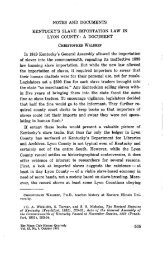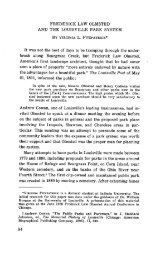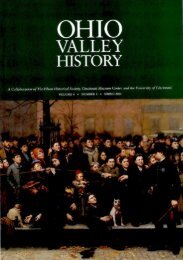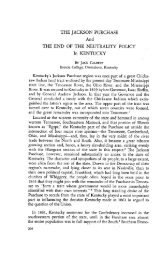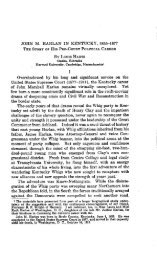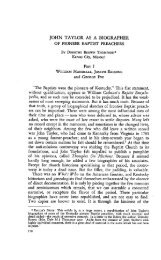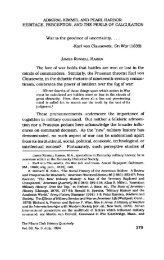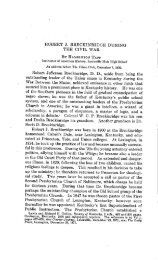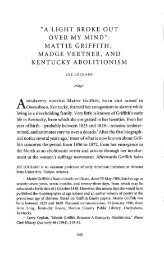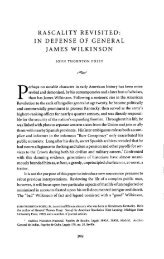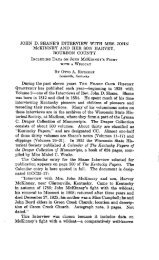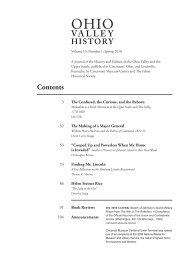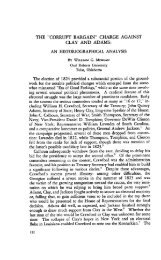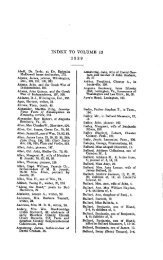MAJOR SQUIRE TURNER From a Portrait " - The Filson Historical ...
MAJOR SQUIRE TURNER From a Portrait " - The Filson Historical ...
MAJOR SQUIRE TURNER From a Portrait " - The Filson Historical ...
You also want an ePaper? Increase the reach of your titles
YUMPU automatically turns print PDFs into web optimized ePapers that Google loves.
<strong>MAJOR</strong> <strong>SQUIRE</strong> <strong>TURNER</strong><strong>From</strong> a <strong>Portrait</strong> "(Photograph by Steffens, Louisville)
¸",,I •,I';li• •,•,I• )•:,I • '"•r ]:,IIL ,i i•'c:lTl'llL, l':• :,,•J i' •,:,liL •. l ,,i
<strong>MAJOR</strong> <strong>SQUIRE</strong> <strong>TURNER</strong>LAWYER, STATESMAN, AND ECONOMISTBY JONATHAN TRUMAN DORRISEastern Kentucky State CollegePaver read before <strong>The</strong> Fi/son Club on December 5. 1949For the third time I have the honor and privilege of bringingto you a contribution to history from Madison County, Kentucky.On my first appearance I related some events of the War Betweenthe States in that county. Five years ago my subject was "WilliamChenault: Citizen, Teacher, and Historian.''1 Now for thesecond time in this hall I acclaiin the fortunes and achievements ofanother native Madisonian, perhaps more worthy than the other.I heartily approve the policy of <strong>The</strong> <strong>Filson</strong> Club in keepingalive the knowledge of little known Kentuckians of the past andtheir part in the history of the State and Nation. <strong>The</strong> writersof school books keep fresh in our memories men like Daniel Boone,Henry Clay, John Cabell Breckinridge, Henry Watterson, andmany other noted Kentuckians; but heroes like David Rice, BasilDuke, Robert J. Breckinridge, Squire Turner, and a host of otherearly prominent Kentuckians are seldom mentioned. Any historianknows that great events and movements are largely shapedby the lesser leaders of society. If we use our imaginations fullythis evening, therefore, we shall see passing in an interestingpageant of Kentucky history, a hero of no mean stature, whoplayed his role vigorously and ably, and who should not beforgotten.<strong>The</strong> earliest American Turners were of good English stock.John Turner and a son came over in the Mayflower in 1620.Neither father nor son survived the rigors of the first Pilgrimwinter on Cape Cod Bay. In 1621 another son of John cameto Plymouth, and from him Major Squire Turner---lawyer,statesman, and economist, was descended. •By the time of the American Revolution descendants of theseNew England Turners were in North Carolina. <strong>The</strong>re Squire'sfather, Thomas, and his grandfather, John, enlisted in the Continentalarmy, serving, apparently, in the First North CarolinaRegiment. A story has come down to the present generationof Turners that a small company of Tories captured the youthfulThomas the night after his enlistment. Some hours later, whilehis captors slept, Thomas took the Tories' weapons and at dawnmarched his enemies off as prisoners of war.At the close of the Revolution, veteran Thomas Turner and33
34 <strong>The</strong> <strong>Filson</strong> Club History Quarterly [Vol. 25his young wife, Catherine Patterson Turner, trekked from RowanCounty, North Carolina, to what soon became Madison County,Kentucky. <strong>From</strong> Rowan County on the Yadkin River, DanielBoone had come to the same locality a few years earlier. Somepresent day Turners think Thomas and Catherine named theirsecond son, born January 26, 1793, for Squire Boone, an elderbrother of Daniel.Thomas Turner was a farmer; so Squire experienced-the-hardand invigorating life-of -a cbun-try-lad, learning the lessons ofindustry, thrift, and resourcefulness which characterized his laterlife. After a fair education in the schools of the community,Squire became deputy county clerk in Richmond, at the age ofnineteen. This position gave him an insight into legal practicesand apparently encouraged him to study law. He seems to haveresigned his position in the county clerk's orifice in 1815, and wasadmitted to practice law two years later.Squire Turner served in the Second War with Great Britain.Biographer John Livingston, to whom I shall refer more particularlylater, states that he volunteered 'tin the autumn of 1812"and "performed the duties of a soldier for one campaign...."Adjutant General Sam E. Hill's published Roster of officers andsoldiers in that war gives October 30, 1812, as the date of Turner'senlistment as a private in Captain Robert A. Sturges's companyof Kentucky Mounted Volunteer Militia.3 Among the Madisoniansin this company was John Speed Smith, who served in 1813on General William Harrison's staff in avenging the Massacre ofthe Raison and who still later became a distinguished son ofKentucky.After serving in the War of 1812 Squire Turner resumed thepractice of law in Richmond, where he soon gained an appreciatingclientele. His contemporaries in Madison County in thatearly day included some of the most prominent men of Kentucky.Among them were Green Clay, Curtis Field Burnum, John SpeedSmith, Daniel Breck, William H. Caperton, Archibald Woods,and Cassius M. Clay. Some of these gentlemen and other lawyersdistinguished the Madison County bar before the Civil War.Confidence in Turner's increasing ability as a lawyer soonencouraged his election to the Lower House of the state legislature.<strong>The</strong>re, 1823-1827, he ably opposed the unconstitutional effortto eliminate the Court of Appeals. 4 This heated controversycame very near precipitating civil war in Kentucky. <strong>The</strong> bitterissue was between the creditor and debtor classes of the state. <strong>The</strong>latter class, with the aid of Governor Joseph Desha, secured a law
1951 ] Squire Turner 35to set aside the state's Court of Appeals, which had sustainedinferior court judgments and foreclosures against debtors. <strong>The</strong>measure was rightly regarded as unconstitutional; and naturallythe new court's provision in the law to relieve debtors arousedgreat opposition. <strong>The</strong> old court remained in session until thecreditor party won the election of 1825. Late that year the newcourt was legislated out of existence and the old court properlyrecognized again. <strong>The</strong> court's records, however, had been forciblyobtained by the new court element, which refused for a time toreturn them. Early in January, 1827, Turner was made chairmanof a committee of the House to investigate Governor Desha'sattempt "to resist by force of arms, the action of the legislature"in restoring the records to the Court of Appeals. A little laterhe distinguished himself in a speech upon the report of thecommittee.Turner was returned to the legislature again in 1830-31,during the bitter national struggle between Andrew Jackson andHenry Clay. He was Clay's friend and an advocate of many ofthe Great Compromiser's principles, and aided Clay in placingKentucky among the strong Whig states of the country. Bythe 1830's emancipation sentiment had gained much ground inKentucky. Clay had leanings in this direction, and in January,1831, Turner, in supporting a bill in the House to stop the furtherimportation of slaves into the state, pointed out the economicevils of slavery. He declared Kentucky to be unsuited to slavelabor, and believed that restrictions should be placed on its increasefrom other slave states. He supported his contention with figuresand made comparisons between Kentucky and free states whichwere favorable to free labor. 5 Yet Turner was not an Abolitionistor even an emancipationist, as I shall show later.Turner's speech was a live topic in Kentucky for many months.<strong>The</strong> Lexington Observer for October 21, 1831, devoted nearlyfour columns to quotations from it. Even William Lloyd Garrison'sLiberator, an Abolition publication issued first in January,1831, devoted forty-seven lines to details of the bill which hadprovoked Turner's speech. 6 In 1833 the legislature enacted a lawprohibiting the importation of slaves after that year. Nevertheless,the question of slavery was the dominant issue in the stateconstitutional convention of 1849, in which Turner played aprominent role. 7Turner was again elected to the legislature in 1839. Consequently,he was responsible for the enactment of many beneficentstatutes during his years as legislator. He was especially compe-
36 <strong>The</strong> <strong>Filson</strong> Club History Quarterly [Vol. 25tent in drafting laws, a qualification lacking in most law-makers.One such measure relieved litigants from the necessity of takingtheir witnesses from remote parts of the state to the Court ofAppeals at Frankfort. This had been an inconvenience towitnesses and a considerable expense to suitors. <strong>The</strong> new lawpermitted evidence to be placed on record in the inferior courtsand later certified to the Court of Appeals. sAnother undesirable law- made a_deed-or-mortgage-inCalidunless-a-seal o¥ fcroll-had been affixed to it. Turner had thisprovocative requirement removed from the statute. He alsodrafted and secured the enactment of a law affecting the inheritanceof property where the deceased had not made a will. <strong>The</strong>old law permitted a child who had already received a full shareof his parent's estate to share equally with the other children, ifthe parent died intestate. <strong>The</strong> new law stopped this injustice.<strong>The</strong>se three examples indicate the high quality of service thatSquire Turner rendered Kentucky as a legislator.During the twenties, thirties, and forties Turner practiced lawwith great success. Indeed his knowledge of jurisprudence andhis astute ability in pressing his cases to the advantage of hisclients won him an enviable position among the best barristers ofthe state. John Livingston's Biographical Sketches of EminentAmerican Lawyers, published in 1852, devotes much space to him.Since this work is contemporaneous, a few sentences might wellbe quoted from the forty-five-hundred-word eulogy:"During the long period that Mr. Turner had practiced hisprofession," says Livingston, "he has at one time or another comeinto competition with a large portion of the most distinguishedlawyers of the state. <strong>The</strong> bar of the county in which he resideshas, during all that period, been distinguished for ability andlearning.... <strong>The</strong>re are William H. Caperton, Daniel Breck, JohnSpeed Smith, and other resident lawyers, besides a host who attendfrom other counties.... In every court in which he has practiced,he is distinguished by a thorough knowledge of the facts and lawof his cases, and an untiring vigilance in preparation for trial. ''•Livingston then compares Kentucky court scenes of that dayto the strategy and movements of opposing generals and armies."<strong>The</strong> practice in heavy jury trials," says he, "may be aptly comparedto the movements, marches and counter marches of twoopposing armies, where the commanding generals are each onthe lookout for the safety of his own men, and an opportunityto avail himself of a false movement or error of his adversary. Ineither position of general or advocate, knowledge, firmness, judg-
19 51 ] Squire Turner 3 7merit, vigilance and tact are indispensable to success--with allthese Mr. Turner may be truly said to be well endowed." <strong>The</strong>biographer follows these laudations with numerous illustrationsof Turner's adroitness and scholarly legal practices which madehim so formidable in the courtroom. 1°Squire Turner's contributions as a legislator and his successesas a lawyer were certain to be properly recognized by scholarsand higher institutions of learning. In 1843, Centre Collegeconferred on him the honorary degree of Doctor of Laws. ChiefJustice Ewing and Judge William Owsley were also honored inlike manner at this college commencement. Owsley had been amember of the Court of Appeals, whose constitutional right toexist Turner had successfully defended in the twenties. He waselected governor in 1844. I should also state that Turner wastwice offered a judgeship on the Court of Appeals, but declinedbecause of the small salary. 11Much dissatisfaction developed with Kentucky's second constitutionin the late thirties and the forties. Since the Court ofAppeals had upheld the constitutionality of the law of 1833forbidding the importation of slaves, the proslavery element haddesired to make the constitution more favorable to slavery at thefirst opportunity. In fact, slavery had become the dominantpolitical issue throughout the nation. <strong>The</strong> annexation of slaveholdingTexas and Cassius M. Clay's <strong>The</strong> True American, publishedin opposition to slavery, both in 1845, had set Kentuckyon fire. 1• <strong>The</strong> Mexican War, which made possible more slaveterritory, further augmented the threatening situation. Yet theforces of freedom in Kentucky, which included Henry Clay, anadvocate of gradual emancipation, were determined not only toprevent the increase of slaves in the state by importation butultimately to free all the slaves in the state. To forestall this, theproslavery party caused the General Assembly, in January, 1849,"to call a convention for the purpose of readopting, amending orchanging the constitution." Delegates were to be elected inAugust, and the convention was to convene on October 1, 1849.Both sides realized that success in the convention depended onthe choice of delegates. Cassius M. Clay called an emancipationconvention at Frankfort in April, which resolved to run candidateswho, if elected, would favor a constitution prohibiting "theimportation of any more slaves into Kentucky," and permittinglegislation providing for gradual emancipation)sMadison County was allowed two delegates, and Squire Turnerand William Chenault (father of William Chenault, one of the
38 <strong>The</strong> <strong>Filson</strong> Club History Quarterly , [Vol. 25founders of <strong>The</strong> <strong>Filson</strong> Club) became candidates. Cassius M. Clay,a much younger Madisonian than Turner, opposed Turner indebate at every opportunity. At first Clay appeared to be gettingthe better of Turner and began to consider himself a likely candidatefor the convention. <strong>The</strong> men had never been friends, andnaturally the debates became acrimonious.Those who are not familiar with the tragedy at Foxtown, nearClay's home, during the campaign, should-read-the-aecouhts in - -Cassius M.-Clay's-Menc6ii.s-and J. Winston Coleman's Slavery--Times in Kentuclty. I shall merely state that after Turner haddenounced Clay, Clay took the platform and abusively attackedTurner. <strong>The</strong>reupon Cyrus Turner, Squire's oldest son, interruptedthe speaker and a general fight ensued.. Young Turnerstabbed Clay in the back, and his brother, Thon•as, tried to shoothis father's adversary. Though desperately wounded, Clay recoveredhis bowie knife and fatally wounded Cyrus Turner. Bythat time Clay's son, Warfield, obtained a pistol and handed itto his father, but Clay was too weak from loss of blood to use it. **"Cash" Clay may be said to have won at Foxtown, but SquireTurner and William Chenault were elected delegates. A littlelater, during a debate in Paducah, Judge James Campbell shotand killed Benedict Austin, his opponent for the convention.Campbell was not elected.<strong>The</strong> proslavery party, to which Squire Turner belonged, wasvictorious in the election of delegates. Hardly a dozen memberswere chosen who sympathized with emancipation. Slavery wastherefore the dominant issue in the deliberations of the convention,taking one fourth of the members' time. <strong>The</strong> April 1949issue of <strong>The</strong> <strong>Filson</strong> Club History Quarterly contains an excellentarticle on "<strong>The</strong> Question of Slavery in the Kentucky ConstitutionalConvention of 1849" by James P. Gregory, who was thenteaching history in Tulane University. Gregory's long articleindicates, as an examination of the printed volume of the debateswill show, that Squire Turner was probably the most able memberin the discussions of that question. Nevertheless, he lost muchfor which he stood. TMOn the third day of the convention Turner offered twelveresolutions for the constitution, two of which concerned slavery.He would not allow the legislature to free the slaves without theconsent of their owners, but he did favor laws to permit ownersto free their slaves after creditors had been satisfied. Moreover,he would have emancipated persons sent out of the United Statesat the expense of the emancipators, and sold again into slavery
19 51 ] Squire Turner 3 9if they returned to Kentucky. Being against the importationof more slaves, he proposed that only such persons as were thenin slavery and who might be the descendants of female slaves,could be slaves in Kentucky. Furthermore, he would allow onlysuch slaves to be brought into the state as belonged to bona fideimmigrants and to citizens of Kentucky who inherited slaveproperty in other states. Turner's other resolutions concernedthe qualification and election of officers, the meetings and powersof the legislature, the composition of the courts and the qualificationsand tenure of judges, the procedure in amending or makinga constitution, the benefits of writs of error to persons accusedin criminal proceedings, and the manner of ratifying the proposedconstitution. TMOf course, some other members of the convention offered provisionsfor the new constitution, but I have only time to summarizebriefly Turner's argument for his slavery resolutions.<strong>The</strong>rein may be found elements of statecraft and sound economy,for that time at least. First he pointed out the wisdom of adoptinghis resolution restricting emancipation. Both the nationaland Kentucky governments, he stated, were based on the principle"that private property should be secured against the exactionsof government." Such constitutional guarantees had beenprompted by abuses of the English government in colonial times,and should be preserved. Furthermore, the expense of freeing allthe slaves and their deportation to Africa would be prohibitive.Such action would saddle a debt upon the state that would virtuallyenslave the whites. It would also be an injustice to theNegroes, whose condition would be far less desirable than theirpresent state. In fact, Turner believed slaves in Kentucky werein a better condition than the white laboring population of anypart of the world. 17His dislike for free Negroes caused him to declare the existenceof such to be a curse to both the whites and the blacks wherethey lived together. Moreover, since Negroes were not able toresist the evil influences of vicious white men, they should notbe freed until they could leave the state. Indeed, he believed freeNegroes in Kentucky were not as well-off as the slaves.On the subject of restricting the importation of slaves, Turnerhad much more to say. He pointed out the fact that the law of1833 restricting importation had not been well enforced. In fact,the legislature had been tampering with it, and for that reason hedesired the prohibition incorporated into the constitution. Leavingthe subject open for legislation would forever encourage
40 <strong>The</strong> <strong>Filson</strong> Club History Quarterly [Vol. 25agitation for laws that would allow importations in some manneror other. Frequent political issues on the subject would createdissention and insolence among the Negroes. <strong>The</strong>re was evidenceof such behavior among slaves in recent years because of discussionsrelative to their welfare. TMTurner's long discussion of the probable economic effects ofimportation indicates his comprehensive understanding of the--problem of slave labor. According to his careful 6alc•lation, slave-labor did not-pay-n/offthan three per cent net profits. Especiallywas this true where only one-fourth of the slaves were able toproduce more than it cost to keep them, which was usually thecase. <strong>The</strong> remaining three-fourths, being old men and womenand children with little capacity for profitable work, togetherwith women too near child birth, either before or after, werehardly able to produce enough to pay for their subsistence. Hereasoned, therefore, that it would be unwise to invest any morecapital in slaves through importations. Since white labor wascheaper in the long run, he believed it would be to the interest ofslave-holders to sell their slaves, except for the fact that suchsales would be a great misfortune to the slaves.In Turner's opinion, the presence of slaves had a wholesomeinfluence on immigration from Europe. <strong>The</strong> free North encouragedthe coming of undesirables along with the better class, butonly desirable immigrants came to the slave states. Thus, on thewhole, slave labor exercised a beneficent influence on Southernsociety by keeping paupers and criminals away. This, he believed,was an advantage to both whites and Negroes in the Southland.Nevertheless, it was true that free labor in the North producedcheaper goods than slave labor in the South. Turner remindedhis hearers that they bought clothing and furniture inMassachusetts and Ohio for less than the same goods could beproduced at home. He reasoned, therefore, that freedom wasconducive to an industrial and cheaper economy than was producedby slave labor, which made an agrarian economy necessary.Another reason for indorsing slavery, Turner stated, was thatit kept society from "becoming fixed and settled." In Virginiaand Kentucky, overseers had risen in the social, political, and economicscale. Often they had become plantation owners, whilemany descendants of original planters had declined in importance.In New York and Massachusetts, he believed, society was moreconstant. He admitted that there were exceptions; and he concludedthat he was neither for nor against extending or increasingthe institution of slavery. Nevertheless, he had observed, with
19 51 ] Squire Turner 41some exceptions, that persons reared among slaves were morelikely to become distinguished than persons reared in free territory."'Who has ever seen such another constellation of greatmen as the Southern states have produced since Independence?"he asked. "Look at the great men of Virginia, South Carolina,and of Kentucky, . . . where are the men who are worthy to becompared with them in the free states of the north?" he answered.<strong>The</strong>re had been an Adams or two---and a Webster he admitted.Great men, he declared, were to be found in the South, where"there is a nobleness of spirit, a feeling above littleness, a greatnessof soul that grows up where.., slavery exists, that is scarcelyto be found in any other country...."After stating his opposition to forced emancipation or generalimportation, because either would be a great loss to the state,Turner expressed the opinion that the institution of slavery wasbecoming less secure. For that reason he deemed any further investmentin slaves as unwise. <strong>The</strong> meddlesome abolitionists ofthe North, he said, were increasing facilities for the escape ofslaves in the border states. That in itself made slaves in that arealess valuable. Yet there.was still another factor which Turnerbelieved would ultimately spell the doom of slavery and usher infree labor--that was the hand of Providence.At this point Squire Turner became a seer or prophet. "Now,"he said, "I make use of one observation which probably somegentlemen will take exception to. I say there is no man livingwho sees in the hand of Providence what I see, who does notperceive that there is a power at work above us, that is above allhuman institutions, and one that will yet prevail, even in Virginia,Maryland and Kentucky.... I desire that it be restrictedby whatever legislation we may adopt on the subject--but whenthe Deity has sent forth his fiat that this institution [of slavery]is to cease, it will cease, and no human effort can arrest it." <strong>The</strong>sewere such" expressions that men like Garrison, Clay, and Lincolnwere uttering, but in an entirely different spirit. Turner wasneither emancipationist nor abolitionist. He was trying to be apractical Southern political economist."I do not believe that the institution of slavery is going toexist for all time," he continued. "I am convinced from theevidence about me that it will not, . . . I have not been able tocome to any other conclusion, and I have given the subject a carefulexamination." He believed, therefore, that slave ownersshould be satisfied with the natural supply of slaves, and thatthere should be no resort to importation. He continued to ex-
42 <strong>The</strong> <strong>Filson</strong> Club History Quarterly [Vol. 25pound his subject to show that there had been an appreciableincrease in the wealth and population of Kentucky since the lawrestricting the importation of slaves had been enacted in 1833."Now," he said, "put this provision in the constitution, and letit appear that this traffic is to cease so far as the investment ofcapital and the bringing in of slaves is concerned, and Kentuckywill rise up and be more powerful."Turner criticised many states, especially Virginia, for raisingslaves for themarket. He-gave Tennessee and Texas as exceptions,saying that he understood Tennessee's recently elected legislaturewas unanimously opposed to the importation of slaves into thatstate. TM As a further argument for his resolution he insisted thatimportation would allow many inferior and even worthlessNegroes to be brought into Kentucky, since owners usually desiredto get rid of that class. Moreover, he reminded his hearersthat "the whole civilized world had turned its back upon theAfrican slave trade...." He wanted to know, therefore, whatwas worse in that business than interstate slave trade. To himthere was nothing more wrong than to go into another state andtear mothers from their children and husbands from their wives,without any charges against them, and then drive them away tomarket as if they were beasts. In his opinion, the African tradewas preferable.Turner said much more on the subject of slave labor on otherdays before the provisions pertaining to slavery were finallyshaped for the constitution. His utterances in support of hisresolutions of October 10, however, indicate his later positionon emancipation and importation.2° His recommendation onemancipation was incorporated into the constitution, but his resolutionon immigration did not fare so well. <strong>The</strong> whole matterof importation of slaves was left to the legislature, which was again for those who favored interstate slave trade.21In 1850, Governor John T. Crittenden appointed SquireTurner, ex-Governor Charles A. Wickliffe, and Chief JusticeSamuel Smith Nicholas to revise the laws of Kentucky. Subsequentlythe legislature under the new constitution unanimouslyelected them to the same station. This arduous task required agreat deal of research into the common and civil law, the revisedstatutes of several other states, and other useful sources. Turner"prepared nearly all the chapters on landed property," as well asmany chapters on other phases of the law. <strong>The</strong> new code was sowell done that the legislature adopted the committee's report"with very few amendments.''22
1951 ] Squire Turner 43In passing, I should like to appraise Turner's economics ofslavery as expressed in his support of his resolutions on slavery.In 1831 he had first presented this significant subject in supportinga bill in the legislature to stop the importation of slaves; butin 1849 his sane evaluation of the meagre returns from slave laborwas the result of many more years of observation and study ofthe subject. He was not the first Kentuckian, however, to realizethat Kentucky should have been a free state. "Father" DavidRice had ably but vainly recommended that condition before thestate's first constitutional convention in 1792.2s Turner said thatif there were no slaves in Kentucky, he would be for keepingthem out; but since slavery had existed in the state from thebeginning, the expedient thing to do was to protect and regulateit to the best advantage of the commonwealth. Nevertheless,he supported the argument of those who deplored slavery foreconomic reasons as well as on moral grounds?4We wonder, therefore, whether Turner's economics of slaveryever influenced Hinton Rowan Helper in preparing his ImpendingCrisis of the South, published first in 18577 In this book theyoung North Carolinian strongly opposed slavery on economicgrounds, offering figures to prove his point in much greater profusionthan Turner had done. <strong>The</strong> logic of Helper's argumentso impressed Republican opponents of the expansion of slaverythat they published and used the book as a campaign documentin 1860. If Turner's utterance on the subject influenced Helpereven indirectly, one might conclude that the Kentuckian contributedto the election of Lincoln in 1860--something he certainlyhad no intention of doing. 2•Squire Turner was not a secessionist, though he may have sympathizedsomewhat with the South during the Civil War. Hecertainly predicted "the Irrepressible Conflict" when he declaredbefore the constitutional convention in 1849: •'I desire that it[slavery] be restricted by whatever legislation we may adoptupon that subject.., but when Deity has sent forth his fiat thatthis institution is to cease, it will cease, and no human effort canarrest it. ''•" He was a Southerner, however, and never would headmit that the Constitution of the United States provided forthe coercion of a sovereign state or the harsh treatment of individuals,allowed during the war.Many persons during the Civil War, in the border statesespecially, were accused of disloyalty to the Union, and werearrested and taken to court. Sometimes they were imprisonedfor a time. Often they were required to take the oath of alle-
44 <strong>The</strong> <strong>Filson</strong> Club History Quarterly [Vol. 25giance to the United States and give bond for their subsequentgood behavior. This happened many times in Kentucky. JudgeBland Ballard handled most cases in Jefferson County, and JudgeJames W. Embry, in Madison.27Descendants of Squire Turner insist that their grandfather(or great-grandfather, as the case may be) was arrested at leasttwice, and taken North, where he was detained for weeks. Ihave been unable to find any writte_n or published record of-hishaving experienced such-trd-atrrSent. Since many other Madisonianswere arrested and gave bond, I rather think he had somesuch experience. As late as December 9, 1864, he wrote his wifethus: "I am unconditionally released, [but] no bonds, [and] nooath. I shall not leave here before Monday evening and possiblynot that soon, as the guerrillas are very bad. Every horse fromhere to Nashville is being pressed. Yesterday horses were takenout of ladies' carriages on the streets and [the] ladies left in thecarriages. No doubt the rebels are coming to Kentucky [again],if they can. Hood and'Breckinridge are both coming.... ,,2sSince this letter was written in Louisville, its contents are proofthat he had been arrested and taken to this city on account of anaccusation of disloyalty. No court record of the case appearsto exist. This action was late in 1864, while most of such casesoccurred in 1861 and 1862, when, under the circumstances,Squire Turner might be expected to have been molested on accountof his behavior, since some officials in Madison County were hisenemies. A great-granddaughter of his states that he was treatedthus several times. This lady, Mrs. May Turner Jones, has a newsaccount dated August 17, 1861, of a peace meeting in Richmond,Kentucky. Squire Turner presided and James B. McCreary, latera congressman and governor of Kentucky, offered ten resolutionscalling for a cessation of hostilities and peace. 29 <strong>The</strong> approvalWas unaninlous.On September 13, 1864, Turner published a letter in a Richmond,Kentucky, paper, which in the light of the foregoing oughtto be given here in toto. Since the letter comes from such eminentsource and concerns one of the most important presidentialelections in our history, it deserves careful consideration. Furthermore,it contains the substance of the argument in the borderstates against the reelection of Lincoln. It is as follows:Richmond, Kentucky, September 13, 1864Dear Sir: You who have heard me talk so frequently, and thosewith whom I have constantly corresponded, know that I havealways been for the Union, and believed that on its preservation
1951] Squire Turner 45depended the prosperity and happiness of the people; . . . thatI was proud of the name of an American citizen, a name thatwas honored throughout the habitable globe.Knowing this, I need not tell you how much I was gratifiedat the nomination of General McClellan for the presidency andmy hearty approval of his letter of acceptance.I have been called a Southern Rights man; but, like most ofthose so designated in this part of the state, I never for onemoment permitted my judgment or feelings to be alienated fromthe Union and Constitution bearing the signature of GeorgeWashington.My only sin has been in never having had confidence inAbraham Lincoln, and in pointing out in public speeches earlyin his administration that he would visit on us the oppressionwe now fear.It may be asked what we have to expect from the election ofGen. McClellan. I answer, we may expect to have trial by juryrestored, and be free from arrest, unless proved to be guilty ofan offense by a creditable witness; . . . that a person arrested shallbe furnished with the charges against him, and the accused allowedto refute the charges by evidence.State institutions and constitutional rights and private propertywill be respected, and beyond all, Black Republicans andabolitionists will cease to rule.I believe that if McClellan is elected we will have peace witha restored Union and ycith little more bloodshed.No more of our people will be dragged into the army, and ourtaxes will be not further increased.<strong>The</strong> Southern people have no confidence in our present rulers.<strong>The</strong>y believe that the subjugation of the South, the confiscationof Southern property, and the destruction of slavery are the mainobjects of the war with the party now in power. <strong>The</strong>y wellknow that McClellan would not insist on these things, and thathe and the party which would come into power with him wouldnot infringe on state institutions or carry on a servile war.Long experience has taught me that in settling controversiesconfidence of each party in the desire of his adversary to do whatis just and right is indispensable. I confidendy believe that theSouth would confide in General McClellan's desire for a reconciliationon fair and equitable principles. What a gloriousachievement it would be for a settlement with a restored Unionand a respected Constitution.
46 <strong>The</strong> <strong>Filson</strong> Club History Quarterly [Vol. 25In this part of the state the people have been much bowed down;but, since the nomination and acceptance of McClellan and thecheering prospect of his election, our citizens are anticipatingfuture prosperity and enjoyment.Yours, Squire Turner3°Turner may have gotten in trouble late in 1864 because of thisletter. His opposition to the reelection of President Lincoln wascertai_n to_cause_his-enemies-to tryto embarrass hifia, esp-ecially....... after the election. He had a perfect right to publish his sentiments,and neither then nor at present should his action be heldagainst him. It is comforting, however, to read his declarationfor the Union, which should refute any statements to the contrary.31In reality Turner's public career ended with his work in therevision of the laws of Kentucky in the early 1850's, when hewas about sixty years old. In the time of Albefi W. Barkley thatseems rather early to retire from public service, for the "Veep"would have us believe that life really begins at three-score-andten-plus.Apparently Turner preferred to look after his lawpractice and business interests, which had become considerable.In fact, a while before his death, in 1871, he was regarded as therichest man in Madison County and even in central Kentucky.A few years before his demise he had given each of his five children$50,000, Cyrus's son Charlie counting for the father. He hadmanaged Cyrus's business so well, after the son's tragic death,that the estate was estimated as being worth $350,000 in the1870's. Squire Turner himself left considerable property evenafter giving such large amounts to his children. <strong>The</strong> report ofthe administrators of his estate gives 570 different items of indebtednessto him, ranging from $5.00 to $10,000. Manyexceeded $500.32All this goes to prove that Squire Turner was a practicaleconomist, not only in affairs of state but also in his privatebusiness life. Moreover, he had touched the lives of many menin their youth. Several prominent lawyers owed their inspirationfor the law to him. Those who studied under his direction ineludedGovernor and United States Senator James B. McCreary;William Chenault, lawyer, teacher, and historian; a nephew,Squire Turner, who became noted in Missouri; Samuel T. Glover,later prominent at the St. Louis bar; and William N. Hatch,another prominent Missourian. Even Samuel Freeman Miller,whom Lincoln appointed to the United States Supreme Court, issaid to have been inspired by Turner to abandon medicine and
1951] Sqldre Turner 47study law. Squire's son, Thomas, served one term in Congress.William went to Washington, Indiana, where he became prominentat the bar of his adopted state. Both studied law undertheir father,mSquire Turner also had two daughters, Mary Ann and Catherine.Mary married Thomas J. Hood, a lawyer of Clark Countyand a member of the constitutional convention of 1849. Catherinemarried Matthew J. Haden of Woodford County, later adistiller and wholesaler of Louisville. <strong>The</strong> mother of these finedaughters and sons was Elizabeth Stone, daughter of Josiah Stone,a pioneer of Madison County who was descended from two governorsof Maryland, William Stone and John Hoskins Stone. Fiewas also a nephew of Thomas Stone, signer of the Declarationof Independence. z4Squire Turner died on July 7, 1871, in his seventy-ninth year.His passing was noted in the press of the state as being that of nocommon man. <strong>The</strong> Madison bar adopted appropriate resolutionsin his memory. Some sentences deserve mention: "During thislong period at the bar, he never missed a court in his own countyand but one in Garrard and Estill. <strong>The</strong> practice of the law washis absorbing passion and happiness, and in it he made, to thelast degree, the use of his abilities. His vigilance and alertness,joined with his knowledge of the law, . . . and his skill as a practitioner,rendered him always a formidable opponent, and wereof service to the members of the bar at which he practiced....His labors as a lawyer have been of signal service to the professionin the state, as his great perseverance and laborious research havecaused to be gathered up and incorporated in the decisions of ourcourts principles heretofore lying latent upon the surface of thecommon law, or seemingly hidden in the depths of equity jurisprudence.''z•Such expressions of appreciation were well deserved, andmarked the passing of a truly gifted, worthy, and prominentcitizen of Madison County and Kentucky.FOOTNOTES1 See J. T. Dorris, "William Chenault: Citizen, Teacher, and Historian,"<strong>The</strong> <strong>Filson</strong> Club History Quarterly, Vol. 19, No. 2 (April, 1945).e For this account of Turner's early life see Eminent American Lawyers(1852), edited by John Livingston of the New York Bar, pp. 634-40. Manuscriptsprepared by descendants of Squire Turner, one an able great-grandsonof Turner, were also used. <strong>The</strong>se manuscripts will be referred to hereafter asthe Turner Papers. Sometime they probably will be deposited in the CollegeLibrary in Richmond. <strong>The</strong> National Cyclopaedia o[ American Biography, Vol.XIX, pp. 110-11, also gives a sketch of Turner's life.
48 <strong>The</strong> <strong>Filson</strong> Club History Quarterly [Vol. 25a Colonel Samuel South commanded the regiment• Adjutant General Sam E.Hill, Report of the Adjutant General, State of Kentucky, Soldiers o[ the Warof 1812 (Frankfort, Ky., 1891),'pp. 247-48. Some descendants of Turnerbelieve their ancestor was a major in this war, though he was only nineteenwhen he enlisted. <strong>The</strong> Turner Papers. <strong>The</strong> original Annual Return of theThirteenth Brigade of the Militia of Kentucky for the year of 1825" and alsofor the year 1826, to Major General Edmund Baxter, signed by Samuel EstlU,Brigadier General, and Squire Turner, Major and Inspector, indicate that SquireTurner was a major in the Kentucky militia many years after the close of theSecond War with Great Britain. Evidently it was in this militia thathe aequir•d - -_ -- the military rank cr-edi•e•t to him thereafter. <strong>The</strong> "Annual Returns," or reports,are in my possession. <strong>The</strong>y appear to have been expressed to Richmond fromFrankfort in the 1890's and never returned.4 Arndt M. Stickles, <strong>The</strong> Critical Court Struggle in Kentucky, 1819-1829(Indiana University Publication, 1929), gives the best account of the"Old Court" and "New Court" affair in Kentucky. See also Livingston, op. cir.<strong>The</strong> Turner Papers.o <strong>The</strong> Turner Papers contain citations from the Observer and the Liberatorconcerning this subject.7 In 1841 a futile attempt was made to repeal this law.s See Livingston, op. c/t.9 Ibid.10 Ibid.zz Ibid. and the Turner Papers. <strong>The</strong> French Tipton Papersl seven manuscriptvolumes and other material on Madison County history in my possession, stareTurner refused the judgship on account of the low salary. "MemorandumBook," p. 52.t2 See <strong>The</strong> Writings Of Cassius Marcellus Clay including Speeches and Addresses,edited with a Preface and Memoir by Horace Greeley (Harpers &Brothers, New York, 1848), pp. 211 ff.; <strong>The</strong> Life of Cassius Marcellus Clay,Memoirs, Writings and Speeches (Cincinnati, 1886), Ch. VI; J. WinstonColeman, Jr., Slavery Times in Kentucky (Chapel Hill, 1940), Ch. XII.zs Clay's Memoirs, etc., op. cir, pp. 175-77.s4 Ibid., pp. 184-87. <strong>The</strong> account of this fight, by friends and relatives ofSquire Turner, is much more favorable to Turner than to Clay. A greatgranddaughterof Turner wrote, Feb. 6, 1945, that "Cyrus Turner was struckdown from behind by one of the men with Mr. Clay, and as he was rising Clayleaned over his stooped body and dashed him with the seven inch knife." Thisknife, found in Clay's bed after his death, is in my possession. <strong>The</strong> TurnerPapers. <strong>The</strong>re was a scathing article against Clay by Richard Runyon andSquire Turner in a Richmond, Ky., paper soon after the tragic affair at Foxrown.Apparently Clay never answered the charges. W. H. Miller, "ManuscriptHistory of Madison County," Vol. III, pp. 794-95. <strong>The</strong>re are six carefullyprepared, huge volumes of Miller's manuscript in the College Library in Richmond.<strong>The</strong>re is an index volume.tn James P. Gregory, Jr., "<strong>The</strong> Question of Slavery in the Kentucky ConstitutionalConvention of 1849," <strong>The</strong> Eilsou Club History Quarterly, Vol. 23,No. 2 (April, 1949).xo Report of the Debates and Proceedings of the Convention for the Revisionof the Constitution of the State o[ Kentucky 1849 (Franl•fort, 1849), pp.24-25.
1951] Squire Turner 49x7 Ibid., pp. 70-71.is Ibid., pp. 72-79, for this and the following paragraphs on Turner's speechsupporting his resolutions on slavery.1o Ibid., p. 75.2o Ibid., pp. 81, 82, 85, for Turner's other remarks on slavery.21 <strong>The</strong> Constitution of Kentucky, 1849, Article Ten. See also Gregory, op. cit.22 Livingston, op. cit.22 Robert H. Bishop fed.), An Outline of the History of the Church in theState of Kentucky, containing the Memoirs Of Rev. David Rice (Lexington,1824), Part Ill, "Slavery Inconsistent with Justice and Good Policy."24 Report of Debates, etc. op. cit.2• One of Turner's descendants believes that his ancestor's "economics ofslavery" may have influenced Helper. At any rate, Turner's argument precededHelper's Impending Crisis of the South, but not Rice's "Slavery Inconsistentwith Justice and Good Policy," first printed in 1792 and containing at least12000 words. Lincoln disavowed Helper's Impending Crisis, even though itwas used to encourage his election in 1860. See J. G. Randall, <strong>The</strong> Civil Warand Reconstructior• (1937), p. 228 and n. 1.26 Report of Debates, etc., op. cir. p. 75.2• <strong>The</strong> records of the U. S. Circuit Court for Kentucky in the FederalBuilding, Louisville, contain hundreds of such arrests and peace bonds and oaths.2s Copy of letter in the Turner Papers.20 Mrs. May Turner Jones to J. T. Dorrls, Feb. 6, 1945, in the Turner Papers.In the 1890's a great-grandson of Squire Turner was a student in a selectschool for boys in Louisville conducted by Jason Walker Chenault, a brotherof William Chenault, one of the founders of <strong>The</strong> <strong>Filson</strong> Club. Professor Chenaulttold this student that Squire Turner and Alexander H. Stephens of Georgiaand Vice-President of the Confederate States were friends, and that Stephensvisited Turner in Kentucky at least twice about the time of the beginning ofthe War. <strong>The</strong> men had been Whigs with similar early political views and evenlater agreed on the unwisdom of secession, but supported the movement afterit got under way. During one of these visits (perhaps the last), said Chenault,Turner unfolded to Stephens a plan for putting the newborn Confederacy ona sound financial basis. Briefly stated, the substance of the plan was this: Sincethe South had no funds, the new nation would have to go on a flat money basisat once. A solid base and stability for such currency would have to be providedto assure credit abroad and confidence at home. This could be done by rushinggreat quantities of cotton to London and Cherbourg by the aid of merchantships of the world. Thus cotton in the warehouses of England and France wouldstabilize credit abroad and facilitate business at home by enhancing the valueof the currency, consequently independence would be more likely.No one knows, apparently, whether Stephens ever presented the proposedplan to the President of the Confederacy or to any one else in authority at theSouthern capital. Stephens was never in good favor with Jefferson Davis; andwe do know that the plan was never carried out. Moreover, I have not beenable to find any other evidence of any alleged Stephens visit to Kentucky. <strong>The</strong>Turner descendant, however, believes his able and worthy teacher knew whathe related to be so. In fact, he stated that in his young manhood, he couldhave obtained affidavits from reputable persons in Madison County that Stephensmade visits to Squire Turner in Kentucky as Chenault told his student. Correspondenceof 1945, 1949, 1950 in the Turner Papers.
50 <strong>The</strong> <strong>Filson</strong> Club History Quarterly [Vol. 25so This letter speaks for itself, though its spirit of Unionism is contrary tothe sentiment which some of Turner's descendants believe their worthy ancestorbore toward the Union. I would guess that Squire Turner voted for John Bell,who carried Kentucky for President in 1860. I believe also that Turner wasfor the Union during the war (as he stated in this letter), and that one reasonhe supported McClellan in 1864 was the fact that the Democratic candidate forPresident had fought to maintain the Union and would have preserved theUnion had he been elected. Squire Turner supported the Union, but not Lincoln'sadministration. This letter was not mere political propaganda as it has recentlybeen defined. <strong>The</strong>re are too many people today who believe_their-ancestorswere_ardentsympathizers for the Cbnfe-der•[e States when they were merely--opponents of the government at Washington, because of its extremely harshmethods of dealing with individuals and because of other objectionable policiesof Lincoln's administration. <strong>The</strong> Turner Papers do not reveal Squire Turneras the Union sympathizer that I believe him to have been. On the contrary,they describe him as otherwise. <strong>The</strong>re is no doubt in the mind of a greatgrandson,who was informed by older relatives, that Squire Turner was arrestedand taken north of the Ohio River and detained more than once for his pro-Southern utterances during the war, but as yet I have not found any contemporaryevidence of such treatment. If I ever do find such evidence, I shallendeavor to relate it in <strong>The</strong> <strong>Filson</strong> Club History Quarterly.sl Squire Turner had bitter enemies, especially in Madison County, whoapparently sought to embarrass him during the Civil War. Apparently CircuitCourt Judge William C. Goodloe frequently tried to entangle Turner in themeshes of Federal laws regulating conduct during hostilities. Turner had causedmany of Goodloe's decisions to be reversed by the appellate court at Frankfort,and for other reasons Goodloe and Turner were not friends. <strong>The</strong> Turner Paperscontain one item of more than forty typed single-spaced pages under the heading,"Notes and Comments Pertinent to the Story of Squire Turner," preparedcarefully in 1945 by a worthy great-grandson of Turner.sz Will Book T. pp. 582-607, Madison County Court office vault; date ofwill, June 18, 1870.as <strong>The</strong> Turner Papers.as Ibld.ss Ibid. <strong>The</strong> only poetry Squire Turner ever subscribed to was: "Lawyers,I'm sure, must starve or plead; and follow, right or wrong, where guineas lead."Ibid.



